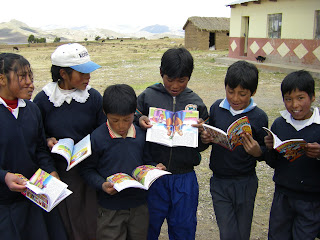 We woke up at 6:30 to start packing the box lunches. The tour bus picked us up at 8:00 and we were on our way to Atuncolla, a small community outside of the Sillustani Funeral Temples (about 45 minutes away from Puno.)
We woke up at 6:30 to start packing the box lunches. The tour bus picked us up at 8:00 and we were on our way to Atuncolla, a small community outside of the Sillustani Funeral Temples (about 45 minutes away from Puno.)It seemed like a normal tourist outing, but in reality, the big yellow tour bus of All Way Travel hauled out a special group of passengers: Nina Fogelman, Director of Ancient Summer Enterprises, Inc., Mery Calderón, Director of Kuoda Tours Agency, Victor Pauca, Manager of All Ways Travel, Jeny Juño, President of the Chamber of Hotels and Owner of Kusillos Posada Hostal, her son, Gerson, Enrique, and myself.
The bus was also hosted boxes of story books, encyclopedias, and a bookshelf. The purpose of the trip was to inaugurate a new approach to tourism, connecting tourists with locals, and both parties to education with the objective of supporting the educational potential rural youth. The tourism project is based on the curriculum that Victor and I developed during my first months here as a Fulbright. Now, it seems, our dream is becoming a reality. Victor, Mery, and Nina are very committed to supporting the development of social conscientious tourism that promote local, culturally sensitive development in the rural communities of Puno. Nina brought together a very gracious donation of books and shelves. All three are hopeful that their clients will be interested in participating in the tourism route.

During our trip, we gave books to children in a local kindergarden and elementary school. Money was also raised by Nina and her contacts to improve the sanitation services for the elementary school.

The amazing part of this whole effort is that tourists can participate both directly and indirectly.
Those that wish to visit the communities can take part in the trip through any of the three tourism agencies. They can visit the schools, meet the children and work with them as tutors to read and with other academic development needs. At the same time, they get a chance to see the BEAUTIFUL lagoon and the temple ruins of Sillustani or Lake Titicaca.


Those that do not want to visit the sights, or want to support indirectly can make donations (monetary or in the form of academic materials like books, pencils, etc.) either to Nina in the US or with Victor in Puno. If anyone would like to see the profile of the program, I would be happy to mail them a copy via my work email: samka_puno@hotmail.com

